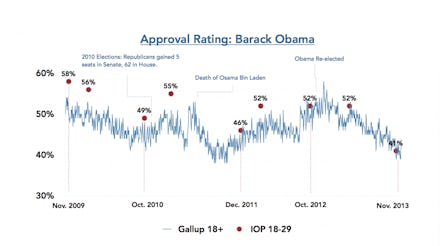Millennials Officially Hate Obama. Here's Why.

The news: A new poll conducted by Harvard University’s Institute of Politics has revealed that young Americans’ support for President Barack Obama has reached the lowest point yet. According to the poll, only 41% of Americans aged 18-29 approve of Obama’s performance in office, an 11% drop since April.
Source: Harvard University Institute of Politics
Debt-weary millennials are disillusioned with Obama’s performance with regard to the economy, the implementation of the Affordable Care Act, his handling of foreign relations. They’re similarly dissatisfied with the performance of Congress as a whole; a full 52% of the poll’s respondents would, given the option, opt to recall the members of the House and Senate. However, while young people are clearly discontent with the current political landscape, no clear alternative has appeared to capture young people’s enthusiasm and support.
The background: While young voters played a crucial role in Obama’s 2012 electoral victory, they overwhelmingly identify as political independents. As a result, they can expect to be heavily courted during the coming 2014 midterm campaigns, as Republicans capitalize on displeasure with Washington, and Democrats hold Youth Summits and appeal to young people’s idealism.
Fox News scion and GOP deputy press secretary Rafi Williams will be tasked with frantically tweeting at his fellow twentysomethings and buying ad time on Spotify, while the DNC banks on young independents’ traditional preference for liberal candidates. Both parties will spend 2014 embarrassingly pandering to young people and prostrating themselves before an altar filled with whatever they think kids are into these days. (Right this very minute, confused party operatives are pacing around conference rooms and shouting, “Snapchat?! Doritos tacos?! Cosplay?! Tom Hiddleston dances?!” at one another.)
The takeaway: While millennials are, as a whole, more diverse than their forebears, and more likely to support social justice issues like gay marriage and marijuana legalization, they’re also unlikely to see government programs as viable solutions. That goes double for millennials under the age of 24, who have moved even further away from the Democratic party than their wizened late-20s peers.
Socially liberal but fiscally conservative moderates and dissident partisans like Rand Paul are likely to garner support from younger people, regardless of party affiliation. That said, it’s equally likely that millennials’ electoral participation will drop sharply from 2012 levels, as the 19% of millennials looking for work and the and the 58% of millennial graduates paying off loans may be too busy solving their own problems to solve Washington's.